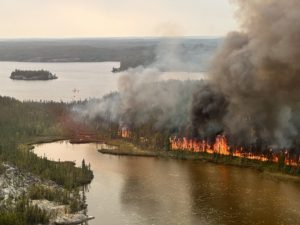One-half of the territorial government’s “biggest after-action review” into the historic wildfire season last year will be released tomorrow at noon.
Prior to that, there will be a 30-minute media availability with staff members to answer technical questions regarding the review based on an embargoed report sent to media today.
Questions will also be raised concerning the GNWT’s response to recommendations from the report.
That session will be led by Erin Kelly, deputy minister, Environment and Climate Change.

NWT Environment and Climate Change Minister Jay Macdonald in 2023. (CKLB files)
Jay Macdonald, minister, Environment and Climate Change, will also lead a media session with representatives from auditors and business consultants MNP.
More than 4.1 million hectares of forest were affected by 303 wildfires during the 2023 wildfire season.
The unprecedented evacuation of the territorial capital last summer resulted in major disruptions to people’s lives and the NWT’s economy.
There were especially harsh criticisms on how Indigenous people were treated, especially the homeless or Elders who only speak their traditional language.
Questions were also raised about communications between the City of Yellowknife and the GNWT, right up to cabinet level, particularly in the hours leading up the evacuation order on August 16th.
Concerns were levelled at both levels of government over the lack of pre-planning and the actual need to evacuate the capital at all, since the most concerning fires never reached anywhere near the city limits.
When a request for proposals was issued in February for a third-party contractor, Minister MacDonald recounted his experience as deputy mayor of Fort Smith.
“Not only in my role as minister but also as resident deeply affected by the events of 2023, I welcome the enhanced independent review of the wildfire response last summer,” he stated.
“It is our job as leaders to learn from the challenges we faced in an emergency of this scale and put those lessons to work to ensure we respond effectively going forward.”
For the first time in the NWT, homes and businesses in communities were lost due to wildfire in 2023. Cabins outside of multiple different communities were also lost.
The 2023 wildfire season saw extreme drought conditions, record temperatures, and unusually high winds in many parts of the territory – resulting in extreme fire behaviour.
The independent review was to rely heavily on public engagement through questionnaires and meetings, allowing for anonymous feedback to ensure residents were comfortable providing honest accounts of their experiences.
Engagement was to have focussed on communities that were directly impacted by the 2023 evacuations: Hay River; K’atl’odeeche First Nation; Sambaa K’e; Wekweètì; Behchokǫ̀; Fort Smith; Salt River First Nation; Jean Marie River; Enterprise; Kakisa; Yellowknife; and Dettah/N’dilo.
This review is of wildfire management decisions and actions, led by the department of Environment and Climate Change.
A second, broader independent review of emergency response — preparation, evacuations, hosting, supports — is led by the department of Municipal and Community Affairs and is expected out early next year.
A separate review of the City of Yellowknife’s response to the wildfires by professional services firm KPMG was released in July, the 130-page report contained 26 recommendations to city council about how it could handle another wildfire threat.
The main issues concerned: Evacuation co-ordination; public communications, working with vulnerable populations, emergency operations and evacuation planning.
CKLB will post a summary of tomorrow’s report release first online and then during our 5 p.m. newscast.

The North Slave fire complex on Aug. 17, 2023. (NWT Fire photo)





